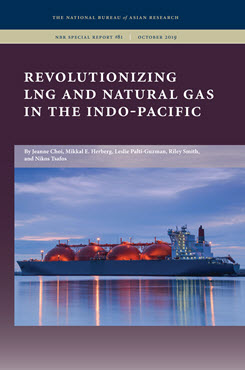The Role of LNG in the United States’ Indo-Pacific Strategy
This essay explores the origins, goals, and limits of the Trump administration’s strategic decision to put liquefied natural gas (LNG) at the center of the U.S. Indo-Pacific strategy.
Executive Summary
MAIN ARGUMENT
With the U.S. emerging as a major LNG supplier, and the Indo-Pacific as the main market for LNG, there is an underlying commercial logic bringing the two together. The Trump administration wants to leverage this mutually beneficial relationship to advance its broader strategy in the region. In some ways, this approach builds on general trends that have been progressing in both the region and the industry, but there is also a possibility of additional investment flowing in response to new policy instruments being created to facilitate gas projects. There are risks, however, in a strategy that relies too much on LNG to further policy objectives. First, the trade in LNG is driven by commercial factors, so there is only so much that the U.S. government can do to have an impact on investment and other decisions. Second, LNG is usually too small to affect a broad and complicated bilateral relationship. Third, overly politicizing a commodity could undermine U.S. strategic interests by reducing confidence in the market and leading countries to take measures that lessen their reliance on LNG more broadly or U.S. LNG more specifically.
POLICY IMPLICATIONS
- LNG is increasingly interwoven into U.S. grand strategy. In some areas LNG can help advance U.S. interests, but it is all too often a limited tool for resolving bilateral or regional disputes.
- Although the private sector will largely dictate the major decisions on how much LNG the U.S. will produce and where it will go, the U.S. government has a clear interest in supporting exports and, to that end, is fine-tuning a toolkit to facilitate investment in gas and LNG infrastructure. At the margins, this toolkit can play an important role.
- U.S. policy often blurs the line between advertising U.S. LNG, nudging countries to buy it, and suggesting that U.S. LNG could solve other political problems in a bilateral relationship. Carrots are fine, but sticks will backfire—at least eventually.
Nikos Tsafos is a Senior Fellow with the Energy and National Security Program at the Center for Strategic and International Studies (CSIS).



